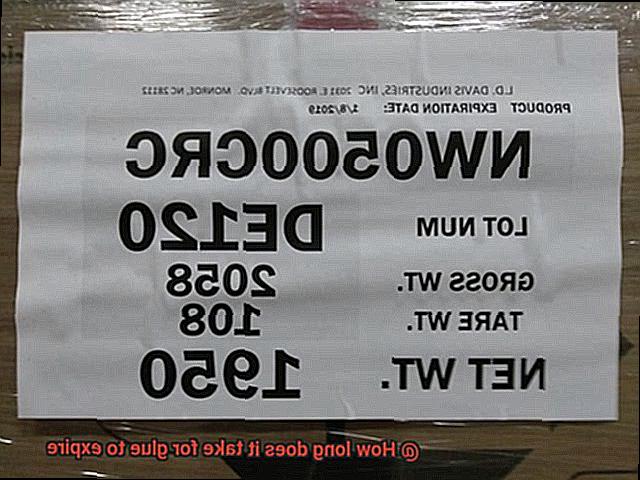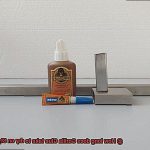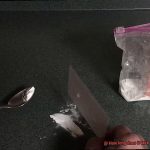Glue, the unsung hero of our crafting adventures and household repairs. It’s always there when we need it, holding things together with unwavering strength. But have you ever wondered if that bottle of glue lurking in your drawer has an expiration date? How long can you count on its adhesive powers before they start to fade away?
In this blog post, we’re diving deep into the captivating world of glue shelf life. We’ll uncover the truth about how long it remains effective, because let’s face it, nobody wants their carefully crafted masterpiece falling apart due to expired glue.
Just like a superhero with a limited lifespan, even the mightiest glues have their limits. As crafters, hobbyists, or do-it-yourself enthusiasts, it’s crucial to stay informed about the longevity of our trusty glue supplies.
The duration of glue’s effectiveness depends on several factors – the type of glue you’re using, how it’s stored, and even the packaging it comes in. So join us as we unravel these mysteries and equip ourselves with practical tips to extend the shelf life of our beloved adhesives.
In the upcoming sections, we’ll explore the different types of glue commonly found in households and analyze just how long they can keep things stuck together. We’ll also reveal telltale signs that indicate your glue may have passed its prime and share some insider knowledge on proper storage techniques to maintain its magical powers.
Get ready for our next blog post where we spill all the secrets to keeping your glue collection fresh and ensuring your projects remain firmly bonded. Because when it comes to glue, timing is everything.
Types of Glue and Their Shelf Lives
Contents
Glue is a sticky substance that helps things stick together. It is available in various types, each with its own unique properties and shelf life. Understanding the different types of glue and their respective shelf lives is essential for using them effectively. Let’s explore these different types of glue and how long they last before they expire.
White Glue (PVA Glue)
White glue, also known as PVA glue, is perfect for craft projects and household repairs. It has a shelf life of around one to two years. However, factors such as exposure to extreme temperatures or moisture can affect its longevity.
To make white glue last longer, it is important to store it in a cool and dry place. Additionally, closing the lid tightly after using it will help prevent air from entering the container and drying out the glue.
Super Glue (Cyanoacrylate Adhesive)
Super glue is famous for its quick-drying and super strong bonding power. It is great for sticking things like plastic, metal, and ceramics together. Super glue can last up to three years if you keep it sealed tightly.
To maximize its shelf life, it is recommended to store super glue in a cool and dark place. This will help prevent exposure to light and heat, which can cause the glue to deteriorate faster.
Epoxy Glue
Epoxy glue is known for its strong bonding capabilities. It comes in two parts that you have to mix together before using it. The shelf life of mixed epoxy glue can be several months to a year, depending on the brand. It is crucial to follow the instructions on the package to know how long it will last. Storing epoxy glue in a cool and dry place is vital to maintain its effectiveness.
Wood Glue
Wood glue is specially made for bonding wood surfaces. There are two types: yellow glue and polyurethane glue. Yellow wood glue can last about one to two years, while polyurethane glue has a shorter shelf life of around six months to a year. Proper storage is key to preserving the shelf life of wood glue. It should be stored in a cool and dry place with the lid tightly closed to prevent air from entering and drying out the glue.
Hot Glue
Hot glue is perfect for crafts and DIY projects. It comes in solid sticks that you melt with a hot glue gun. The shelf life of hot glue sticks can vary, but they usually last for a few years if stored correctly. It is important to keep hot glue sticks in a cool and dry place to prevent them from becoming brittle or losing their adhesive properties.
Remember, these are general guidelines, and the actual shelf life may vary depending on the brand and specific product. Always check the label or manufacturer’s instructions for specific information about a particular glue product. And if you’re not sure if the glue is still good, it’s best to get a new one to be safe.
Now that you know about different types of glue and how long they last, you can use them effectively for your projects and repairs. Just make sure to store them properly and check their expiration dates.
Factors That Affect the Expiration Date of Glue
The expiration date of glue can be influenced by several factors, each playing a crucial role in determining its shelf life and effectiveness. Understanding these factors is essential for ensuring optimal performance and successful bonding in your projects.
Firstly, the type of glue used can significantly impact its expiration date. Different types of glue, such as wood glue, super glue, or epoxy adhesive, have varying shelf lives. Wood glue, for example, is designed for long-term bonding and often contains additives that enhance its durability, resulting in a longer expiration date compared to other types of glue.
Storage conditions also play a vital role in determining the expiration date of glue. Glue should be stored in a cool, dry place away from direct sunlight and extreme temperatures. Heat can cause the glue to degrade faster and lose its effectiveness. Additionally, storing glue in a humid environment can lead to moisture absorption, which may affect its quality.
Exposure to air and moisture are two factors that can significantly impact the expiration date of glue. When exposed to air, glue can undergo a process called polymerization, where the molecules react and harden, rendering it unusable. To prevent this, it is important to keep glue containers tightly sealed when not in use. Moisture can also impact the quality of glue by causing it to become diluted or form clumps, making it difficult to use effectively. Keeping glue containers tightly sealed and avoiding storage in areas prone to high humidity can help protect against moisture damage.
The quality of the glue itself also plays a significant role in its expiration date. Higher quality glues often have longer shelf lives due to their chemical compositions and manufacturing processes. It is advisable to choose reputable brands that prioritize quality control when purchasing glue.
Furthermore, some glues may contain additives or preservatives that help extend their shelf lives. These additives prevent spoilage or degradation over time. Checking the label for any preservatives or additives when purchasing glue can provide information on how they contribute to its longevity.
Lastly, always check the expiration date on the packaging of glue before using it. Using expired glue can lead to weak bonds or unsuccessful adhesion, compromising the quality and durability of your projects.
How to Store Glue for Maximum Shelf Life
When it comes to storing glue for maximum shelf life, there are a few key factors to consider. First and foremost, it is important to store glue in a cool and dry place. Excessive heat and humidity can accelerate the breakdown of glue, leading to a shorter shelf life.
One of the best places to store glue is in a climate-controlled environment, such as a basement or a cupboard. These areas tend to have a stable temperature and lower humidity levels, which can help prolong the life of the glue.
Additionally, it is crucial to keep the glue container tightly sealed when not in use. This prevents air from entering the container, which can cause the glue to dry out or become less effective over time. Many glues come with a cap or lid that provides an airtight seal, but if not, transferring the glue to a small, airtight container can also help.
Another important consideration is to avoid exposing the glue to direct sunlight. Ultraviolet (UV) rays can degrade the adhesive properties of certain types of glue, leading to reduced effectiveness. Therefore, storing glue in a dark or opaque container can help protect it from UV exposure.
Furthermore, it is essential to keep glue away from extreme temperatures. Freezing temperatures can cause some glues to separate or lose their adhesive properties, while temperatures above their recommended range can lead to degradation. Checking the manufacturer’s guidelines for temperature storage recommendations is always advisable.
Lastly, it is worth mentioning that some types of glue have specific storage requirements. For example, certain wood glues may need to be stored upside down to prevent drying out at the nozzle. Reading and following the instructions provided by the manufacturer can ensure proper storage and maximum shelf life for specific types of glue.
Common Signs that Glue Has Expired
Glue is a versatile adhesive that is commonly used for various projects. However, it is important to note that glue has a shelf life and can expire over time. Here are some common signs that indicate glue has expired:
- Change in Consistency: One clear sign that glue has expired is a change in its consistency. Over time, glue can become thick, lumpy, or even watery, indicating a breakdown in its chemical composition. If the glue no longer flows smoothly or spreads evenly, it may be a clear indication that it has expired.
- Change in Color: Another sign to watch out for is a change in the color of the glue. Glue that has expired may take on a yellowish or brownish tint, which is different from its original color. This discoloration could be due to the breakdown of the adhesive properties within the glue.
- Unpleasant Odor: The smell of expired glue can also be a giveaway. Fresh glue usually has a mild, chemical odor, but as it expires, this smell can become stronger or even unpleasant. If the glue emits an off-putting odor, it is best to avoid using it as it may not provide the desired bonding strength.
- Decreased Bonding Strength: The effectiveness of glue can also be determined by its bonding strength. If a previously reliable type of glue no longer adheres well or fails to bond materials securely, it may be an indication that it has expired. In such cases, it is best to switch to a fresh batch of glue for optimal results.
- Visible Separation or Clumping: Sometimes, expired glue may show visible signs of separation or clumping. This occurs when the adhesive components within the glue start to separate due to aging or exposure to unfavorable conditions. Clumps or separation in the glue should be considered as a clear sign of expiration.
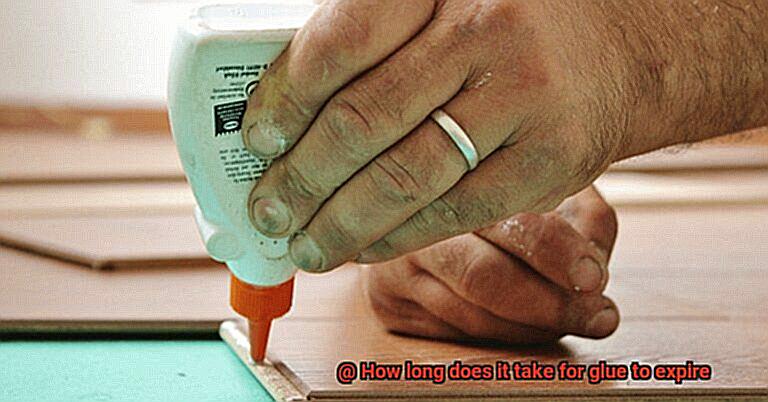
In addition to these signs, some glues may come with an expiration date printed on their packaging. Manufacturers often include this information to guide users and ensure they are using the product within its recommended timeframe. Checking for an expiration date is an easy way to determine if the glue is still usable or if it is time to replace it.
It is also important to use common sense when identifying expired glue. If the glue has been stored improperly, exposed to extreme temperatures, or has been open for an extended period, it is more likely to have expired sooner than expected. These factors can accelerate the deterioration of the glue and reduce its effectiveness.
Super Glues: Shorter Shelf Life After Opening
Super glues, also known as cyanoacrylate adhesives, have revolutionized the world of bonding with their ability to create strong and durable bonds in a matter of seconds. But did you know that these powerful adhesives have a shorter shelf life after opening? It’s true. In this article, we will explore the reasons behind this phenomenon and provide tips on how to maximize the shelf life of your super glue.
Once a bottle of super glue is opened, it begins to react with the moisture in the air. This reaction triggers the curing process, causing the glue to harden over time. Unlike other types of glues, which may remain usable for several years, super glues have a more limited shelf life after opening. The specific duration can vary depending on the brand and formulation, but generally falls within the range of 6 months to 2 years.
However, improper storage and use can further reduce the shelf life of super glue. Heat and humidity accelerate the curing process, causing the glue to harden more quickly. Therefore, it is crucial to store your super glue in a cool and dry place, away from direct sunlight and moisture. This ensures that the glue remains in its liquid state for as long as possible.
To safeguard your precious super glue from premature curing, tightly seal the bottle after each use. This prevents air and moisture from entering and wreaking havoc on your adhesive. By taking this simple step, you can significantly prolong the shelf life of your super glue.
Using expired super glue can lead to unreliable and unsatisfactory results. As the adhesive ages, its properties may deteriorate, resulting in weaker bonds. Materials may not adhere properly or hold up over time, jeopardizing the integrity of your project. To avoid disappointment, it is advisable to check the expiration date on the bottle before using super glue, especially if it has been stored for an extended period. If the glue has expired or shows signs of degradation such as changes in consistency, color, or odor, it is best to discard it and purchase a fresh bottle for optimal performance.
Safety Tips for Using Expired Glue
Glue is a versatile adhesive that is commonly used in various projects and industries. However, using expired glue can compromise the strength of bonds and pose safety risks. In this article, we will discuss important safety tips for using expired glue to ensure that your projects are completed safely and effectively.
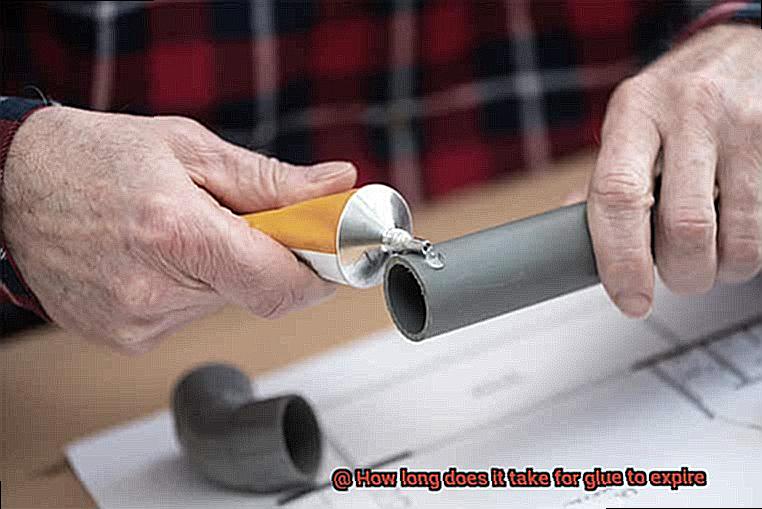
Avoid Critical Applications:
Expired glue may not provide reliable adhesion, especially for projects that involve heavy loads or potential hazards. It is best to use fresh glue within its recommended shelf life for critical applications where strong and secure bonds are essential.
Using expired glue for critical applications can result in weakened bonds, which can be dangerous if the project involves heavy objects or potential hazards. For example, if you are working on a woodworking project that requires gluing together large pieces of furniture, using expired glue could cause the pieces to come apart under the weight, posing a safety risk. Therefore, it is crucial to reserve expired glue for less critical projects where the strength of the bond is not as crucial.
Test the Glue
Before using expired glue, it’s important to test it on a small and inconspicuous area. If the glue fails to bond properly or shows signs of weakness, it should not be used. Testing ensures that the adhesive properties are still adequate for your project.
Testing the expired glue before using it on your actual project allows you to assess its adhesive properties. Apply a small amount of the glue to a test surface and let it dry according to the manufacturer’s instructions. Then, try to separate the surfaces to see if the bond holds up. If the bond is weak or breaks easily, it is a clear sign that the glue should not be used and a fresh bottle should be used instead.
Consider Materials and Project Type:
Different materials may require stronger adhesive properties. Using expired glue on certain materials can result in weak bonds that may lead to accidents or failures. Consider the type of project and material being bonded to ensure optimal adhesion.
Different materials require different adhesives for optimal bonding. For example, if you are working with porous materials like wood, expired glue may not penetrate the surface properly and result in a weak bond. Similarly, if you are working with plastics, expired glue may not adhere as strongly due to changes in its chemical composition. Therefore, it is important to consider the materials you are working with and choose an appropriate adhesive that is within its shelf life.
Ensure Proper Ventilation:
Some glues contain volatile chemicals that can release harmful fumes, especially when past their expiration date. Working in a well-ventilated area or using protective gear such as masks can minimize exposure to these fumes and protect your health.
Expired glue can release toxic fumes that can be harmful if inhaled. These fumes can cause irritation to the respiratory system and may even be toxic in high concentrations. To protect yourself from these fumes, it is important to work in a well-ventilated area. Open windows or use fans to ensure proper air circulation. If working in a confined space, wearing a mask or respirator can provide an additional layer of protection.
Store Safely:
Expired glue should be stored safely and away from children and pets. Although their adhesive properties may be compromised, some glues can still be toxic if ingested or come into contact with eyes or skin. Practice proper storage precautions to prevent accidents.
Even though expired glue may not be as effective in bonding materials, it can still pose safety risks if ingested or come into contact with eyes or skin. To prevent accidents, store expired glue in a secure location that is out of reach of children and pets. Additionally, make sure the cap is tightly sealed to prevent any leakage or drying out of the glue.
Alternatives to Expired Glue
When it comes to alternatives to expired glue, there are several options that can be used for projects and repairs. Here are some of the most common alternatives:
- Tape: Depending on the type of project, you can use different types of tape such as duct tape, masking tape, or double-sided tape. Tape is easy to use and provides a strong bond for many materials. It can be used for temporary fixes or even as a long-term solution in some cases.
- Adhesive putty: Adhesive putty is a versatile product that can be used for a variety of purposes. It is soft and pliable, making it easy to mold and shape into different forms. Adhesive putty is often used for hanging posters or lightweight objects on walls, but it can also be used for small repairs or crafts.
- Hot glue gun: Hot glue guns use sticks of adhesive that melt when heated and then harden as they cool down. This creates a strong bond between materials. Hot glue guns are commonly used in crafts and DIY projects because they provide a quick-drying and durable bond.
- Epoxy resin: Epoxy resin is a more advanced alternative to expired glue that is commonly used in industrial applications. It consists of two parts – a resin and a hardener – that need to be mixed together before use. Once mixed, epoxy resin provides an incredibly strong bond that can withstand high temperatures and harsh conditions. It is commonly used for bonding metals, plastics, and other materials.
- Super glue: Super glue, also known as cyanoacrylate adhesive, bonds quickly and strongly to a wide range of materials. It is commonly used for bonding ceramics, glass, metal, and plastic. However, it is important to use super glue with caution as it can bond skin and other unintended surfaces together.
- Sewing: For fabrics or sewing projects, stitches or fabric glue can be used instead of traditional adhesive. Sewing provides a strong and flexible bond for fabrics, while fabric glue can be used for temporary fixes or embellishments.
- Purchase new glue: If you don’t have any alternatives to expired glue on hand, it may be worth considering purchasing a new tube or bottle of glue. Many types of glue have a long shelf life and can be stored for extended periods without expiring.
6656z8Z9mlQ” >
Conclusion
Glue, like many other products, has an expiration date. But have you ever wondered how long it takes for glue to expire? Well, the answer might surprise you. When stored properly, most glues can last anywhere from one to two years. However, this can vary depending on the type of glue and its specific formulation.
Now, you might be wondering why glue expires in the first place. The main reason is that over time, the chemicals in the glue can break down or evaporate, making it less effective. This can result in weaker bonds or even complete failure when trying to stick things together.
To ensure that your glue lasts as long as possible, it’s essential to store it correctly. Keep it in a cool and dry place away from direct sunlight or extreme temperatures. Additionally, make sure to tightly seal the container after each use to prevent air exposure and moisture from getting in.
When using expired glue, you may notice changes in its consistency or smell. It might become thick and clumpy or develop a sour odor. These are clear signs that your glue has gone bad and should no longer be used.
So next time you reach for that bottle of adhesive, take a moment to check its expiration date. Using expired glue not only compromises the quality of your projects but also poses potential safety risks. Don’t let expired glue stick you with subpar results – always use fresh adhesive for optimal performance.
In conclusion, while different types of glues have varying shelf lives, most glues will expire within one to two years if not stored properly.

